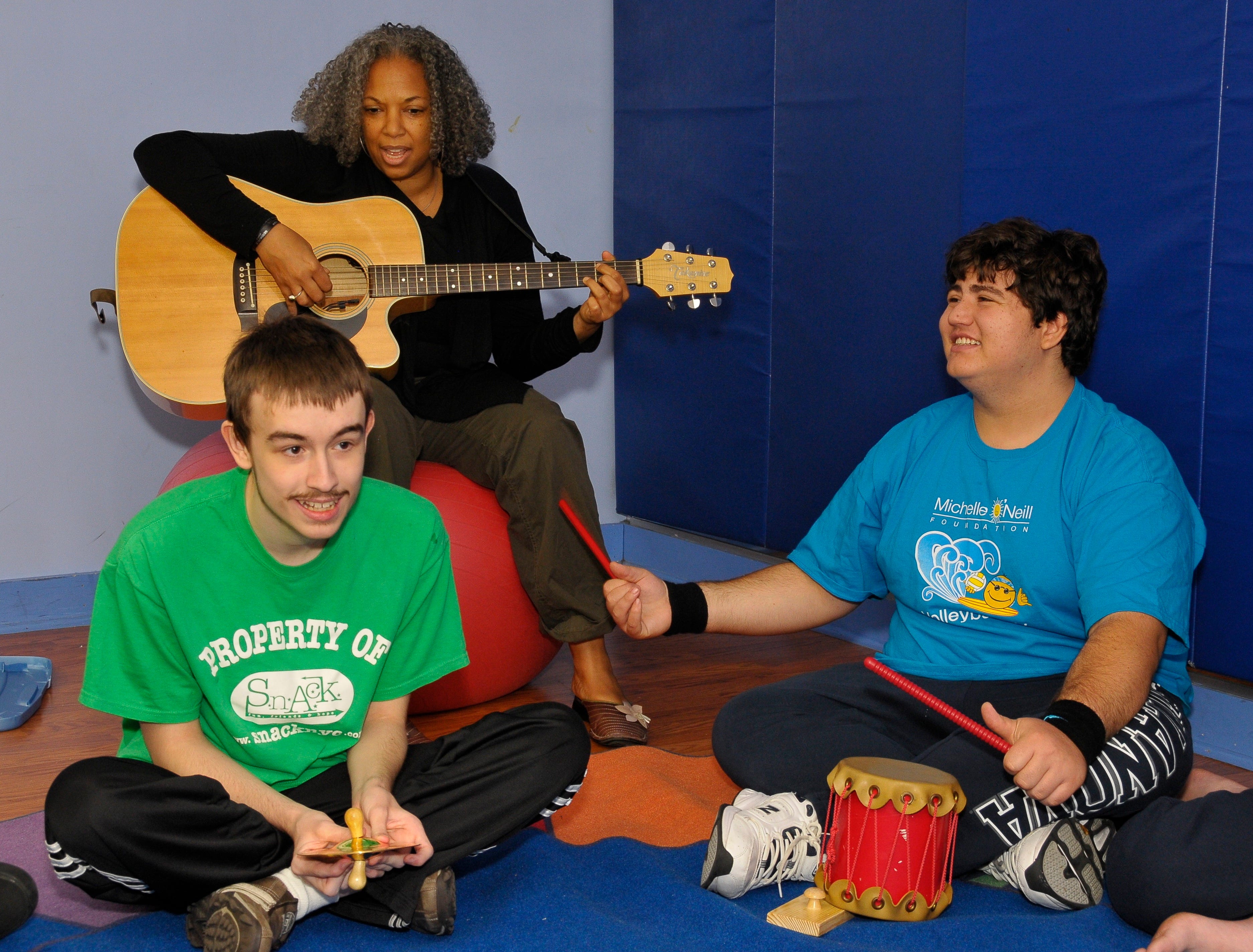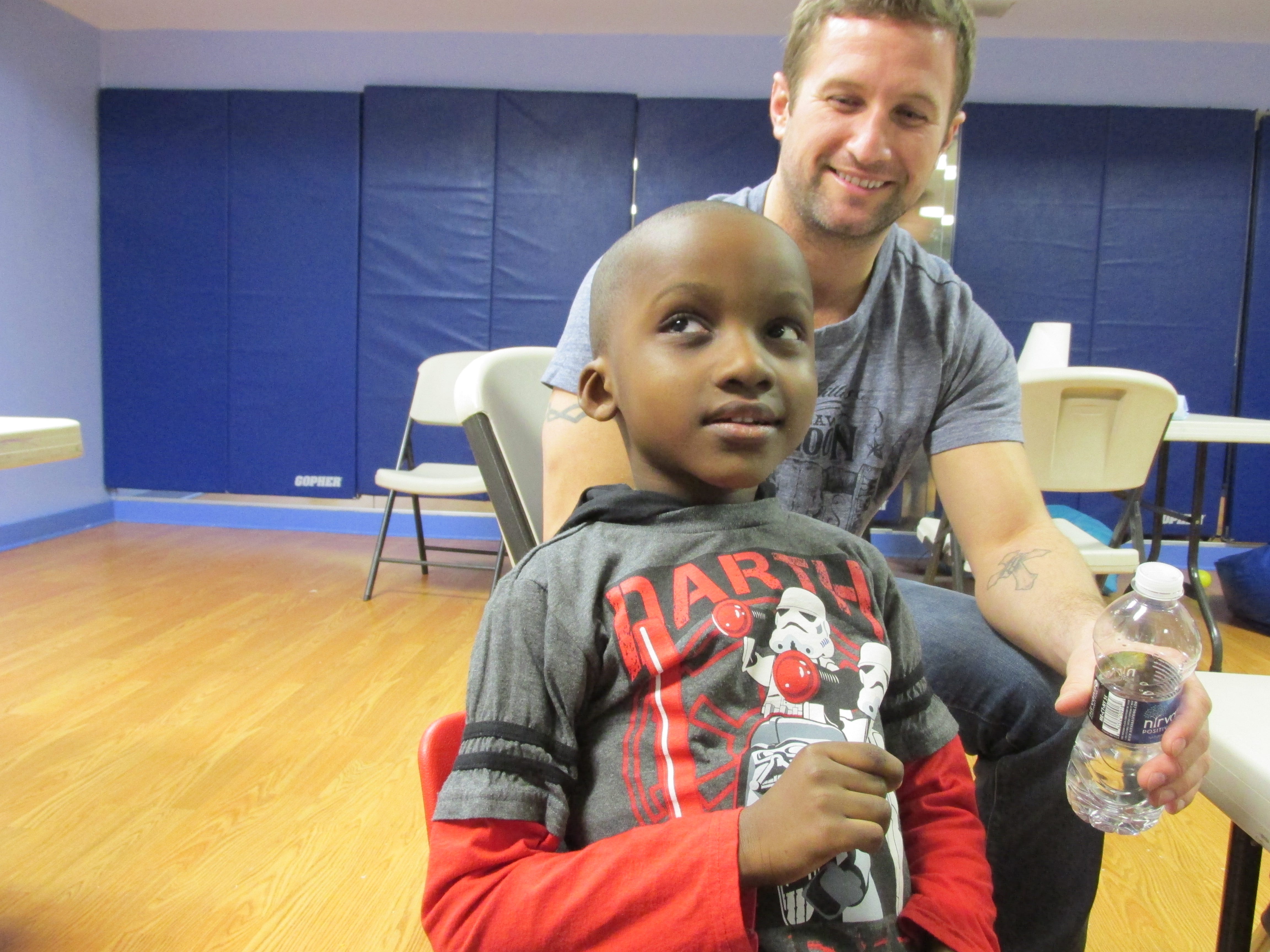
Everybody: Inclusive Design
We first heard about Jackie and Joey’s mission at SNACK* & Friends at the Randall’s Island Park Awards Dinner. Jackie Galatola Ceonzo introduced herself to me after a glass of wine, leading with, “I know what it’s like to be black.”
For viewers at home, Jackie isn’t black.
I waited to hear the follow-up to this brazen introduction.
“You see,” Jackie continues, “my son Joey has autism and is 6 foot tall, 210 pounds. Everywhere we go people make assumptions about who we are and what we want because they think they know us. They either think he can’t do anything or he’s Mozart.”
I sip my water with a smile as I listen because I’m wondering where this is going.
“Thanks to Daquan, we’ve been doing a little soccer with the kids for exercise in our center. We do everything — swimming, soccer, yoga — you name it. So, one day Joey and I are leaving our apartment. This lady walks by with a little black and white dog. Without hesitation Joey lifts the dog with his foot about 3 feet off the ground. It wasn’t a kick or the dog would have been across the street. But the look on that lady’s face was of understandable shock even the though the dog seemed to enjoy the ride.
“But before I let her say anything, I forcefully complained, ‘How dare you put your dog that looks like a soccer ball in front of my autistic son!!!’ and we rushed off in the opposite direction and didn’t look back.”
I had no choice but to come and see what was going on at this woman’s center.
Like most people, I had very little idea what it’s like to raise a child with a disability of any kind. You know that the jokes about the ‘short yellow bus’ were insensitive, but being respectful and having an understanding are two different conversations.

Visiting the Special Needs Activity Center for Kids* for the first time was an eye opener.
The welcoming nature of most not-for-profits is easy to appreciate, but here it’s different. Jackie’s team understands that people want to help, but they want that help to be focused.
“Most people want to work directly with our kids,” Mary Jane Pulzello, Director of Operations, explains. “Until they work with the kids. See, if you’re not trained to work with our kids, you won’t last long.”
The first thing Jackie’s team wants outsiders to leave behind is the notion that every kid at SNACK* has some genius ability that needs to be unlocked. Too many movies and not enough reality has left the general population with the perception that every autistic child is one caring adult away from becoming Kim Peek or Steven Wiltshire. The word savant is never used in the facility. “And we don’t need a piano,” Jackie sighs.
Her kids just want to be kids.

SNACK*’s core curriculum is run by trained educators that understand the range and scope of conversations that each child needs for their development — in the classroom or in the swimming pool. Their level of care and compassion is balanced with the practical application of providing programming that teaches and uplifts every child. Their staff went to college for this. They are trained professionals.
But I found none of that to be special. Different, but not special.
Like most kids, SNACK* kids don’t appreciate their center any more than my kids appreciated their schools. As a parent, you just want your child to enjoy their experience and grow from it. Their appreciation will come later.
The special vibe you get from SNACK* is when you talk to each and every parent. The reality of a parent of a child with special needs is that you can’t just hire any babysitter. You can’t just find any school. You can’t just find any shirt. Every minute of the day has to be tailored to your child’s ability to cope with their world around them and no one prepares you for how difficult that journey will be.
Jeanne Cluess, the Development Director, suggested that I visit with the parent’s that bring their kids to the Friday evening sessions. These ‘snacktivities’ are a chance for the older kids — teens and preteens — to develop social skills and interactions.
Again, not that special. Just different.
Then you talk to the parents.

For ninety minutes on a Friday night, these parents get to go on a date.
A date.
For parents that have struggled with the constant care of their toddler children, getting time for a date night is the ultimate gift. That precious hour you have to not think about work or your kids is an oasis of hope.
Now imagine not being able to find that sort of peace for 12 years.
“At some point our parents had to mentally decide to take on the responsibility of raising a child with special needs,” Liz Brady, the Program Director, explains to me. “But it’s really difficult for them to share that responsibility because almost no one is capable of working with their child. It’s nonstop and it can be lonely.”
For these families, SNACK* is special.
When we offered advice on rebranding the center, we added the asterisk behind the K. Initially Jacking liked the idea because Joey was getting older and she wanted to do more with young adults. But her center wasn’t just for the kids — younger or older. Her center was for the entire family.
The ABC sitcom Speechless explores how a family lovingly copes with a world that doesn’t understand how having a disability affects every moment of their life.
After understanding the weight of how difficult it was to manage the center and how volunteers were pushed to help in ways that didn’t involve working directly with the kids, I was confused when Jackie asked me if my 13 year old son would be interested in volunteering.
As it turned out, young teenagers are the perfect volunteers for SNACK for two reasons.
First, teenagers don’t have the hangups that adults have. They have the ability to be compassionate to the kids at SNACK*, but they also can laugh at a SNACK* student when they do something funny without worrying about being overly sensitive. Teenagers have this wonderful ability to treat SNACK* kids like kids.
Secondly, the parents of growing SNACK* kids need examples of teenagers in their life. Parents of children with special needs have so many other obstacles to overcome when it comes to raising their children, they don’t realize that the social and physical development that occurs with other children when they hit their teenage years.
The hairstyles and fashion and music and social media is not relevant in their family life unless they have other children, so their child never goes through the evolution of becoming an adult. This might sound small, but those choices help the world see your child as an adult as they grow older. “If your 16 year old is dressing like a 5 year old, the world treats your family and your kid a certain way,” Jackie tells me. “What was cute, isn’t cute any more. And you get pity. Pity is no good.”
So having these teens around gives SNACK* families examples of how to help their children develop so their acclamation into the rest of society is less isolating.

All in all, you feel the overwhelming responsibility of the center to provide a very specialized service for these kids and families without making it feel like it’s specialized. Like every under-represented group, you are amazed at how well they push back against every slight they receive, while still laughing uncontrollably at themselves.
While I don’t fully agree with her opening remark, I got to understand the realities of families living with special needs children. We’re more than happy that we have been able to contribute in our own way to helping SNACK* & Friends help other families.
- Good things.

